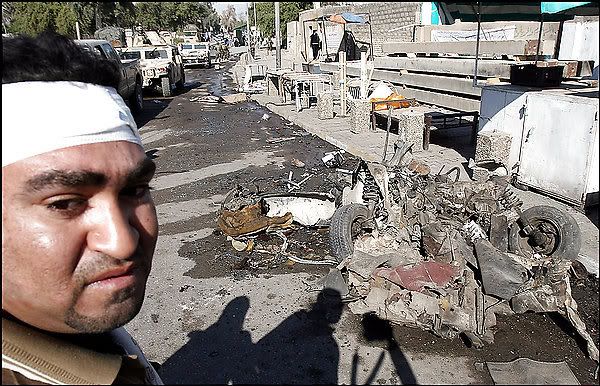 A wounded man stands at the scene of a suicide car bomb attack that killed 10 people in Baghdad. (By Hadi Mizban -- Associated Press)
A wounded man stands at the scene of a suicide car bomb attack that killed 10 people in Baghdad. (By Hadi Mizban -- Associated Press)The Washington Post reports:
A draft law that would ease restrictions on former members of Saddam Hussein's Baath Party, a measure seen by the Bush administration as crucial to national reconciliation, was presented in parliament on Sunday for the first time.
A powerful Shiite faction quickly objected to any moves to bring the Baathists back into government jobs, and a table-pounding argument erupted in the closed-door session, forcing postponement of the debate.
Meanwhile Sunday, a suicide attacker using a car bomb killed 10 people and wounded 29 near the Health Ministry building in central Baghdad, Iraqi police said. It was the latest assault to shatter a relative lull in Iraq's violence.
On Friday, a bomb hidden in a box containing birds detonated in the al-Ghazl animal market, killing 15 people and injuring 55, the deadliest attack in the capital in more than two months.
But violence on average is still down, and U.S. commanders and politicians are increasingly concerned that Iraq's government, riven by sect and competing visions, is not taking advantage of the lull to seek political reconciliation. In particular, the measure on Baathists is viewed as key to bridging the rift between Iraq's majority Shiites and minority Sunni Arabs.
In the wake of the 2003 U.S.-led invasion, thousands of members of the Sunni-dominated Baath Party were dismissed from military and government jobs, retaliation for years of persecuting Shiites. The proposed law would allow them to return to certain positions and collect pensions; thousands have already managed to do so unofficially.
Sunday's objections were raised by politicians loyal to Shiite cleric Moqtada al-Sadr, who withdrew his supporters from the Shiite-led government of Nouri al-Maliki earlier this year.
The argument was ostensibly triggered by claims that the draft law was improperly presented to the legislative body, without first going to its legal committee. But it was clear that the objections rose from deep-rooted sentiments dating to Iraq's turbulent past.
"We reject the return of Baathists to any executive position, not even a hospital manager," said Shiite lawmaker Liwa Smaysim, the head of Sadr's parliamentary bloc. "Our goal is to prosecute the Baath as a party and regime, not only as a regime."
"The Sadrists see the draft law as permissive with Baathists and it would bring them back their jobs. They think it's an amnesty for them," said Mahmoud Othman, an independent Kurdish lawmaker who attended the session.
"We are against the idea of revenge, we want a real reconciliation. The judiciary decides who committed crimes against Iraqis," he added. "Flexibility and forgiveness are needed to reach this goal."
Aside from the law on Baathists, reconciliation legislation to distribute oil revenue among Iraq's sects, reform the constitution and set a date for provincial elections also remain stalled.
Also Sunday, Iraq's most influential Shiite politician, Abdul Aziz al-Hakim, said the United States needed to back up its claims that Iran is fomenting violence inside Iraq, which Iran has denied. The U.S. military has accused an Iranian-backed Shiite cell in Friday's market bombing.
"These are only accusations raised by the multinational forces, and I think these accusations need more proof," Hakim, leader of the Supreme Islamic Iraqi Council, told reporters.